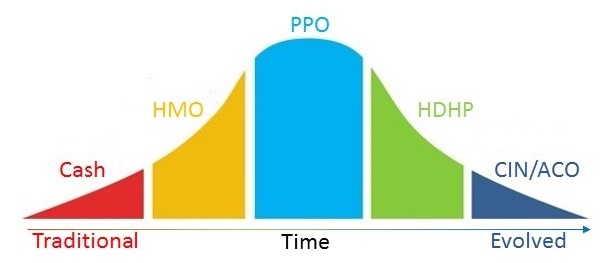Primary Care Physicians and Clinically Integrated Networks: Some Factors to Consider
Clinically Integrated Networks (CINs) and Accountable Care Organizations (ACOs) are vehicles for evolved forms of capitation that include value-based and risk sharing performance incentives, unlike past reimbursement models which focused primarily on utilization (see Figure below).
Both aggregate and align providers, but differ in types of payors. ACOs are paid by Medicare and/or Medicaid, while CINs have commercial insurers. To attain these contracts, a minimum threshold of covered lives must be demonstrated prior to approval. Physicians, particularly primary care physicians (PCPs), are critical players as their patients comprise the covered lives that ACOs/CINs need. Physician hospital organizations, health systems, and hospitals are focusing on recruitment as they try to acquire as much of this newly defined market share as possible. Here are a few critical elements for PCPs to consider when deciding among their many suitors:
- Quantify the amount of time you and your staff will need to commit to complete additional tasks. The commitment you make will likely entail significant changes to your work flow and an increased workload to meet the quality measurements.
- Calculate the required investments (e.g., additional staffing, IT upgrades, and training). Reporting and monitoring performance metrics may require more time than your current staff has available.
- Most importantly, determine the amount of return that will make these investments worthwhile. It may take a few years before you begin earning bonuses as contracts
may not be in place or the performance of your practice will initially fall short.
This monumental venture of converting to a value-based system will require an equally substantial investment accompanied by obvious risk. As the market progresses, the risk and opportunity/reward will decrease but the cost of conversion will remain. Will you be an innovator or take a more conservative approach?
